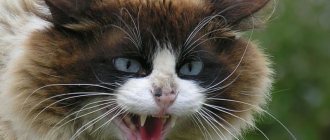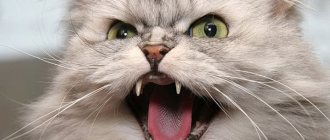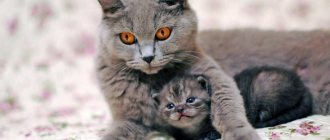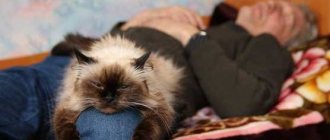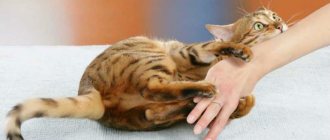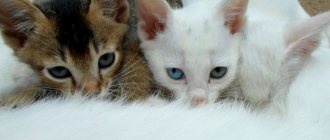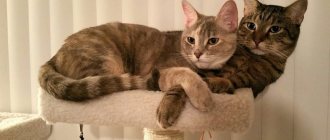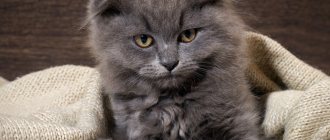Cat meat is consumed in China and Vietnam. However, in difficult times, cats were also eaten in other countries. For example, during the famine in besieged Leningrad. In 1996, the Argentine press wrote about the consumption of cat meat in the slums of the city of Rosario, but in fact such information was in the media of Buenos Aires.
In 2008, it was reported that cat meat is a major part of the diet of residents of Guangdong, China. Cats were brought there from the northern part of China, and one company supplied up to 10,000 cats a day from different parts of China.
Protests in many provinces in China have led to local authorities in Guangzhou taking decisive action against cat dealers and restaurants serving cat meat. Although the law prohibiting the consumption of cat meat was never passed. Restaurants use barbaric methods of torturing animals. They are brought to a state close to death and immersed in boiling water. It is believed that due to the huge amount of adrenaline in the blood of an animal before death, the meat becomes more tender and tasty
A skinned cat carcass is often passed off as a rabbit, since without the skin, tail, head and paws, their carcasses look very similar. In this case, they can only be distinguished by their paws (which is why, when selling a butchered rabbit, the paws covered with hair are left behind). In Spanish-speaking countries, there is an expression “Dar gato por liebre”, which means “to slip the cat instead of the hare.” And in Portugal the expression “Comprar gato por lebre” means “buy a cat instead of a hare.” In Brazil in particular, cat meat is considered disgusting and residents are often afraid to buy barbecue in public places for fear that it is made from cat meat. Since in such establishments hygiene standards are not observed and it is almost impossible to establish the origin of the meat, in Brazil their products are often jokingly called “churrasco de gato” - cat barbecue (in Russia there is a joke about this “buy three shawarmas - build a cat”, and also the expression “kitten pies”).
But the Vietnamese consume cat meat for health purposes, believing that this meat helps with asthma, tuberculosis, heart and other diseases. In the backyards of Vietnamese restaurants you can often see cages with assorted cats - a clear sign that you should not order meat from this establishment.
Residents of the city of Vicenza in Northern Italy are believed to eat cats, although the last occurrence was several decades ago. In February 2010, a famous Italian foodie was criticized on a television show for reporting recent incidents of cat stew being eaten in the Tuscany region of Italy.
During the famines of World War I and World War II in Europe, cat meat was often passed off as Australian rabbit meat. In some Vietnamese restaurants, a dish of cat meat in pots is served under the name “little tiger”, and inside these establishments you can often find cages with cats.
Veterinarians often hear owners ask whether a cat can eat its kittens. Unfortunately, this phenomenon sometimes occurs and affects not only dead but also living cubs. This strange behavior occurs much less frequently in cats than in rabbits and pigs. However, a person who decides to start breeding cats needs to learn about their cannibalism in a timely manner in order to promptly take all the necessary measures to prevent this extremely unpleasant phenomenon.
When is it normal for a cat to eat kittens?
In some cases, the fact that a cat eats its newborn kittens is a normal instinctive behavior that is dictated by nature, and does not mean that there is something wrong with the animal.
Normal reasons why a cat ate a kitten include the following cases:
:
- stillborn kittens - the inanimate offspring are eaten by the cat along with the afterbirth for a speedy restoration of strength and to prevent damage to the den due to the decomposition of the kittens;
- sick offspring - the cat instinctively immediately knows whether the kittens were born healthy or sick. By nature, the animal has an instinct to raise only strong and healthy kittens, the waste of energy on which is justified in relation to procreation. Even when a domestic cat is well-fed and strong, it will not feed the sick offspring and will eat it immediately after birth or in the immediate hours after it;
- prematurity of kittens - if a cat has a miscarriage, she most often does not abandon the kittens, but eats them along with the afterbirth. She herself receives many nutrients from this that help her recover from a miscarriage;
- a very numerous litter - if more kittens are born than the cat can feed, she will keep only the strongest and strongest, and eat the weak ones without waiting for them to die. A cat can give birth to too many kittens every time;
- exhaustion of the body - if a cat brought a second offspring very quickly after the first, then, in order to save her life, she will kill the second litter, since her body is too weakened and she is not able to feed newborn kittens a second time. A female can normally give birth and raise kittens only once a year;
- lack of food (the pet does not suffer from this if it is fed correctly) - if a cat is starving, it cannot raise kittens and eats them to preserve its own life. In the future, she will be able to continue the family line.
In all these cases, the phenomenon of cannibalism, although unpleasant, is natural and should not frighten the owner. It is not fixed and is not preserved in instinct in a cat, so in the future it will not spread in a strong female to healthy offspring under favorable living conditions. If there is an adult cat in the house, then it can kill the kittens, not the cat. In such a situation, cats eat their kittens after finding them dead.
Feeding formulas
Kittens can be given formulas intended for children. These are the well-known products Malyutka and Malysh, Nestozhen, Nutrilon. Prepare them according to instructions
There are 2 simple recipes for preparing a nutritional mixture, but it is important to follow all dosages:
- cow's milk, homemade – 50 g;
- powdered milk – 15 g;
- dry nutritional yeast – 3 g;
- egg - 50 g of white with yolk and 50 g of foam from a beaten egg;
- 1 g sunflower oil;
- 4 g pharmaceutical glucose.
The ingredients are mixed (only in a ceramic container) until they have a homogeneous consistency. The finished mixture is drawn into a syringe.
Another kitten formula recipe:
- 25 g homemade milk;
- 5 g milk powder;
- 2 g glucose;
- 1 g vitamin supplements.
The ingredients are mixed. Vitamin supplements in tablet form must be ground into powder in advance and added to the rest of the ingredients.
Ready-made artificial substitutes. The best food for a newborn is ready-made cat milk substitutes. Recommended brands:
- Pet Lac;
- Nutri Vet;
- Babycat Milk;
- Beapher Kitty-Milk.
The only drawback of artificial milk substitutes is the likelihood that the baby will have allergic reactions to the chosen product.
Veterinarians recommend feeding kittens with infant formula and milk replacers. When preparing it yourself, there is a high probability of making mistakes in the dosage of one of the products, and this can result in the development of complications in the digestive tract.
Pathological causes
A cat can eat kittens for unnatural reasons. The main ones include
:
- hormonal imbalance, due to which the maternal instinct is not formed;
- mental disorders in the female;
- severe stress at the time of birth, leading to the fact that kittens are not perceived as offspring.
For such reasons, the eating of kittens is usually repeated over and over again, and the cat cannot be bred. The only way to preserve the offspring of such an unfortunate mother is to isolate the kittens from her immediately after birth. After this, the owner must independently feed the offspring, which is quite difficult.
In order to reduce the likelihood of your cat eating kittens, you need to provide her with proper feeding and proper care. If during pregnancy the owner maintains the good condition of the cat, then the risk that the kittens will be sick or the cat will not be able to raise them will be minimal. When a pet is put into breeding for the first time, it is worth consulting with a veterinarian and showing him the animal regularly throughout pregnancy.
The answer to the question do cats eat kittens is yes.
.
VETERINARIAN CONSULTATION REQUIRED. INFORMATION FOR INFORMATION ONLY. Administration
The joyful event of the birth of offspring from a pet is often overshadowed by the inappropriate behavior of the mother cat. Instead of affection and care, the animal shows aggression towards the cubs and even eats them. There are many reasons why cats eat their kittens, and in each specific case it is necessary to find out and take measures to prevent the situation in the future.
Cannibalism is intraspecific predation when animals of the same species are able to eat each other. This phenomenon is widespread among fish, insects, and is often found in mammals. Moreover, females are more predisposed to cannibalism than males. The reasons in nature are related to hunger or its threat, a change in habitat. In the wild, eating her offspring is due to an adaptive type of behavior, when, in order to preserve all offspring, the mother eats sick and weak cubs. In domestic animals, the phenomenon of cannibalism is less common. Nevertheless, cases of eating their offspring are often observed in pigs, dogs, and cats.
| Reasons why cats eat their kittens | Rationale for behavior |
| Exhaustion of the female during pregnancy | Growing embryos require large amounts of protein from the mother. This leads to serious nutritional deficiencies in the cat. Protein starvation pushes the pet to eat its young, which are perceived by the animal as a source of protein food. The phenomenon is often observed in homeless, malnourished animals. The period of gestation is accompanied by intense leaching of minerals and vitamins from the mother's body. The level of calcium in the blood decreases especially sharply after childbirth. This causes inappropriate behavior, mental disorder in the animal, and it can destroy its young |
| Weakening maternal instincts | Unfortunately, not all furry mothers show tender maternal feelings towards their offspring. For a number of reasons, many animals, especially first-time mothers, do not show proper attention and care to their newborns. In extreme manifestations, this can be expressed in the form of eating the cubs. A weakening of maternal instincts is often observed during caesarean section. With such an unnatural resolution of pregnancy, animals often suffer from a lack of developed maternal feelings and can eat their offspring. Postpartum eclampsia is often the reason why a cat kills her kittens |
| Psycho-emotional disorders as a result of stress experienced during childbirth can cause cannibalism | Inappropriate behavior of a pet in relation to cubs can be provoked by dissatisfaction with the conditions of birth: lack of a nest, its inadequacy for raising offspring, the presence of strangers and animals during childbirth, etc. The birth act itself is stressful, and unsatisfactory external conditions further aggravate the psycho-emotional disorder, provoking an inadequate perception of the babies. In this regard, newborn kittens should not be handled, as this can also lead to eating, since they no longer smell like their mother. |
| The reason why a cat eats newborn kittens is often a lactation disorder | In the absence of milk in a cat, protective mechanisms are activated in the form of cannibalism, associated with a powerful law of nature - natural selection. The female, at the level of instincts, understands that she does not have food resources in the form of milk, the offspring are doomed to death and must be destroyed. The same mechanism is triggered in case of development of breast pathology |
| Hidden health defects in a newborn at the level of instinct in the mother can lead to the consumption of weak and non-viable offspring | The cat has the ability to identify hypothermic kittens - babies with a low body temperature. Such cubs will not be able to survive, and in order to ensure the life of other kittens, the mother must destroy the weak one. This is an ancient mechanism of nature, which is not lost even by domestic animals. |
| A cat can eat a kitten completely by accident | After each baby is born, the mother gnaws the umbilical cord and eats the afterbirth. This behavior has deep roots in the wild environment: this is how the female cleans her nest and does not attract scavengers and predators to the birthplace of her offspring. In the process of gnawing the umbilical cord and destroying the placenta, the animal may accidentally eat the kitten |
Numerous causes of cannibalism in domestic cats indicate a complex mechanism of this phenomenon.
Treatment
Why does a cat eat her kittens and does it need treatment?
Unfortunately, cannibalism is not a physical disease at all, so drug treatment is inappropriate. Eating one's own offspring is caused by stress or a failure in the instinctual system. The deviation most often appears during the first birth, and subsequently may never make itself felt again.
If a cat has a persistent tendency towards aggression towards its offspring, it is worth blocking the possibility of reproduction. Since there is a high probability of manifestation of this disorder in subsequent generations.
However, this reaction of the animal can be caused by hormonal imbalance. In this case, prophylaxis is prescribed. Progestins are used to correct disorders.
cat and kitten
Reasons why daddy cat destroys offspring
The cat drags the kitten to a secluded place
Cannibalism is inherent not only to domestic cats, but also to cats. As a rule, the female hides her nest from outside animals. But often a cat finds it and destroys the offspring. At the same time, males kill not only strangers, but also their own cubs. One of the likely reasons why cats eat kittens is to stimulate the female to come into heat. If a cat that has given birth feeds its offspring, it will go into heat after 3 to 4 months. If the cubs die, estrus occurs almost immediately after the kittens die. This pushes males to destroy their offspring and thereby stimulate the female to go into heat.
Another reason why cats kill kittens is competition, the struggle for existence. Adult males perceive small kittens as future competitors for food resources, territory, and females. That is why they can destroy both other people's cubs and their own. Also for this reason, at the level of natural instincts, the mother cat tries to place the future nest in a secluded place, inaccessible to other animals.
What should owners do?
What to do if a cat carries kittens? This is the question that puzzles owners as they watch their pet looking for a new place for her offspring and transferring the cubs there.
First of all, it is necessary to understand the reasons that prompt the animal to such actions. Kittens should not be selected or placed in a place chosen by the owner. It is necessary to trace where the cat has found a new place and help build her a nest.
The animal should be denied access to places where the arrangement of a new place would be unsafe (balcony, space under the bathroom, etc.). Under no circumstances should you scold or punish a caring mother.
The animal obeys natural instincts and takes care of its offspring as nature dictates.
Owners sometimes misinterpret why a cat brings kittens to bed. You should not think that a caring mother entrusts her offspring to household members or brags about her kittens. Such feelings are alien to animals. The reason for the behavior is the search for a more favorable place for their offspring. And the master’s bed can be chosen as this place (warm, dry, clean).
There is also nothing touching about an animal dragging its cubs to a person. The reason why a cat brings kittens to the owner is, as a rule, a lack of food. The pet perceives humans as a source of food resources. As babies grow older, milk is no longer enough and they need solid food. This is why a cat brings its cubs to humans as a source of food.
Prevention measures
Experienced breeders, when detecting such inappropriate behavior in a cat, remove it from further breeding, since cannibalism is inherited. The many reasons why a cat strangles her kittens make them difficult to identify. In this regard, the following preventive measures should be followed:
- Balanced and nutritious nutrition for a pregnant female with the inclusion of vitamin and mineral supplements in food. A veterinarian will help you get recommendations on creating the optimal diet for pregnancy and after birth. Monitoring the level of calcium in the blood to prevent postpartum eclampsia should be done through clinical analysis, since both high and low levels of the mineral in the body are dangerous;
- Preparing the nest in a secluded, quiet and safe place, inaccessible to outside animals. A thick cardboard box or exhibition box is suitable for these purposes. The nest should be placed in a dark place. It should be dry and warm. This organization corresponds as closely as possible to the natural conditions inherent in the cat at the genetic level.
- Observation of the birth process of the pet. Unobtrusive help from the owner will calm the mother cat and allow her to control the cat. If aggressive and inappropriate behavior of the mother is detected, newborns should be isolated. The animal, on the recommendation of a veterinarian, may be prescribed sedatives to calm the nervous system.
- Availability of food and water after birth. Food resources should not only be freely available to the cat, but also in close proximity to the nest. This will reduce the mother’s nervousness about leaving her babies in the nest, allowing the animal to quickly get enough and eliminate protein deficiency.
Cannibalism in domestic cats is a serious mental disorder based on ancient natural instincts. An animal with a predisposition to eating its own offspring should be excluded from breeding and breeding. Cannibalism has no cure. However, taking preventive measures will allow you to avoid such complex psychological deviations.
Similar articles
The reasons for the birth of non-viable offspring are varied. If a cat gives birth to dead kittens, what to do in this case and how to prevent stillbirth in the future, owners should have an idea...
Many people have heard that people eat dogs, but do they eat cats? And if they eat it, where, why, and what does their meat taste like? Let's try to answer these questions by turning to the history and culinary traditions of some countries of the world.
Preventive measures
Cannibalism is not considered a physical disease. Therefore, treatment with medications will not give results. If the owner notices that a pregnant cat has an unstable mental state, manifested by excessive activity, fussiness or irritability, he is recommended to increase monitoring of the animal.
It is important to pay more attention to her and show her love more often. A few weeks before the start of lambing, she is provided with a secluded place where she and her brood will feel calm
This could be a special cat house, a box or a wooden box with soft bedding, an entrance hole and a window for observing the birth in order to provide timely assistance if needed.
When kittens are born, it is important to provide the pet with maximum peace and not to be excessively intrusive. But you can’t completely ignore it either.
Other pets should be removed from the room during the birth. The owner must be on alert in order to save the kitten's life in time.
In which countries do they eat cats?
There is little historical evidence of human consumption of cat meat. The fact is that in the mythology of many countries, the cat is a mystical creature, and it was either deified or demonized, but not eaten. If we do not take into account the cases when cats were eaten during times of famine for the sake of survival, then dishes from them were (and still appear) on the table of the peoples of China, Vietnam, Peru, and even in northern Italy. The reason for eating these cute animals, whose meat, according to those in the know, tastes like rabbit meat, lies in the belief of some peoples that they can eat cats to maintain health. For example, the Chinese are confident in this, and in Vietnam, cat meat is considered the best cure for asthma, and a drug that increases sexual desire is prepared from the animal’s gall bladders. Residents of Peru also consider cats to be an aphrodisiac and an exquisite delicacy.
Is it possible to eat cats?
Animal rights activists around the world have pushed for a reduction in the number of restaurants that serve cats and dogs. Similar establishments remain, but they are not advertised as before, even in Peru. And in Italy, human rights activists achieved the dismissal of a famous TV presenter because he stated on air that he had tried cat meat and dictated the recipe. In Russia, the law on cruelty to animals has not yet been finalized, so it is unlikely that anyone will punish cat eaters. Of course, there is no such exotic product in the official trade, so whether to eat cats or not is, as they say, a matter of taste and moral principles of everyone.
Cats have a very well developed maternal instinct; it tightly bonds the baby and the mother. Thus, she completely surrenders to the child, showing maximum tenderness and love. But sometimes something makes us think about whether cats eat their kittens, or whether this is another unjustified legend. And to our horror, once again harsh reality wins.
Why do cats eat kittens?
It is rare, but it happens that cats eat their kittens, this happens immediately after the babies are born. In this case, maternal instinct and the smell of colostrum remained far in the shadow of cannibalism.
The reasons for devouring a baby are not as terrible as the fact of what is happening. Cats usually eat the placenta and kittens that are stillborn. Sometimes they can harm the baby when they gnaw the umbilical cord, or accidentally destroy it along with the placenta. But the mother can do this quite consciously. There are several reasons why cats eat their kittens. If a baby is born weak or with physical disabilities, then it is quite possible that he is doomed to die. Thus, the mother brings into life only strong and hardy offspring.
Another reason why a cat eats her kittens is that the animal’s maternal instinct may not be sufficiently expressed, and the baby, again, is thrown to the mercy of fate. Nature makes its life selection with particular cruelty.
Why do cats eat kittens?
The birth of babies usually takes place in a safe, warm and cozy place that the mother herself considers suitable for her babies. But there are such unfortunate cases when cats reveal where the kittens are and brutally kill them. They eat not only their own, but also other people's cubs.
For thousands of years, there has been a theory that animals do this to get the cat back to being ready to mate. Having given birth to babies, the mother loses all interest in the opposite sex, giving the child all her care and love, and the loss of the cubs provokes a new estrus.
Some experts believe that cats eat other people's kittens to make room for their offspring. And if they kill male cubs, it means they want to get rid of competitors in the future who will be able to lay claim to females and territory.
The animal world is quite cruel and sometimes has nothing to do with morality. But we must understand that their behavior probably has a reasonable explanation, because reflexes and a stereotype of actions have been formed over many millennia.
